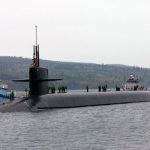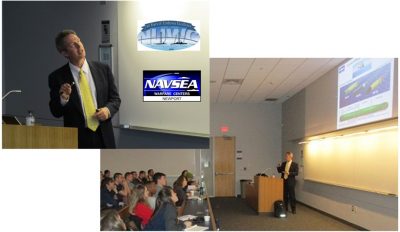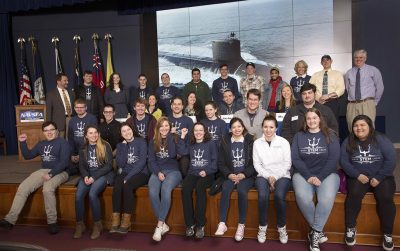Success Stories
Submarine Engineers Simulate Real-Time
Conditions to Test Key Components
Navy STEM Program Hosts Speaker Dr. Robert Koch
URI, UCONN Students learn about NUWC
Newport’s cutting-edge programs during tour.
Web cookies (also called HTTP cookies, browser cookies, or simply cookies) are small pieces of data that websites store on your device (computer, phone, etc.) through your web browser. They are used to remember information about you and your interactions with the site.
Session Management:
Keeping you logged in
Remembering items in a shopping cart
Saving language or theme preferences
Personalization:
Tailoring content or ads based on your previous activity
Tracking & Analytics:
Monitoring browsing behavior for analytics or marketing purposes
Session Cookies:
Temporary; deleted when you close your browser
Used for things like keeping you logged in during a single session
Persistent Cookies:
Stored on your device until they expire or are manually deleted
Used for remembering login credentials, settings, etc.
First-Party Cookies:
Set by the website you're visiting directly
Third-Party Cookies:
Set by other domains (usually advertisers) embedded in the website
Commonly used for tracking across multiple sites
Authentication cookies are a special type of web cookie used to identify and verify a user after they log in to a website or web application.
Once you log in to a site, the server creates an authentication cookie and sends it to your browser. This cookie:
Proves to the website that you're logged in
Prevents you from having to log in again on every page you visit
Can persist across sessions if you select "Remember me"
Typically, it contains:
A unique session ID (not your actual password)
Optional metadata (e.g., expiration time, security flags)
Analytics cookies are cookies used to collect data about how visitors interact with a website. Their primary purpose is to help website owners understand and improve user experience by analyzing things like:
How users navigate the site
Which pages are most/least visited
How long users stay on each page
What device, browser, or location the user is from
Some examples of data analytics cookies may collect:
Page views and time spent on pages
Click paths (how users move from page to page)
Bounce rate (users who leave without interacting)
User demographics (location, language, device)
Referring websites (how users arrived at the site)
Here’s how you can disable cookies in common browsers:
Open Chrome and click the three vertical dots in the top-right corner.
Go to Settings > Privacy and security > Cookies and other site data.
Choose your preferred option:
Block all cookies (not recommended, can break most websites).
Block third-party cookies (can block ads and tracking cookies).
Open Firefox and click the three horizontal lines in the top-right corner.
Go to Settings > Privacy & Security.
Under the Enhanced Tracking Protection section, choose Strict to block most cookies or Custom to manually choose which cookies to block.
Open Safari and click Safari in the top-left corner of the screen.
Go to Preferences > Privacy.
Check Block all cookies to stop all cookies, or select options to block third-party cookies.
Open Edge and click the three horizontal dots in the top-right corner.
Go to Settings > Privacy, search, and services > Cookies and site permissions.
Select your cookie settings from there, including blocking all cookies or blocking third-party cookies.
For Safari on iOS: Go to Settings > Safari > Privacy & Security > Block All Cookies.
For Chrome on Android: Open the app, tap the three dots, go to Settings > Privacy and security > Cookies.
Disabling cookies can make your online experience more difficult. Some websites may not load properly, or you may be logged out frequently. Also, certain features may not work as expected.
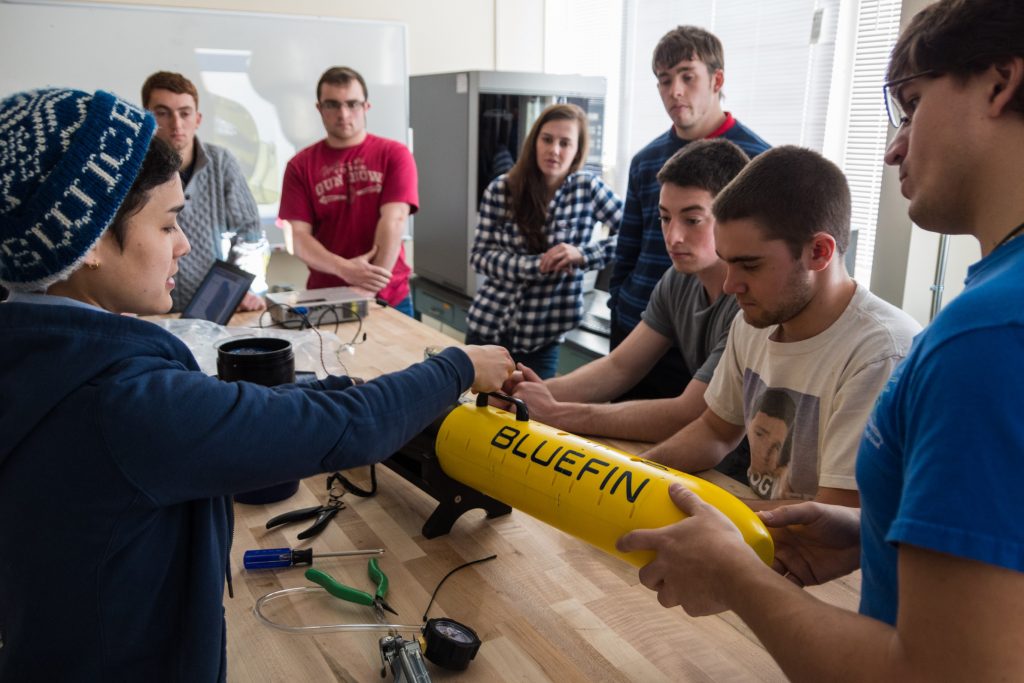 UConn and URI are teaming up with the U.S. Navy to provide a new opportunity for engineering undergraduates considering careers in the Navy and undersea engineering. The project incorporates community building, education, leadership, and professional development components to inspire students and prepare them for Navy careers. Here, URI ocean engineering students prepare for an at-sea test of an autonomous underwater vehicle. (University of Rhode Island Photo)
UConn and URI are teaming up with the U.S. Navy to provide a new opportunity for engineering undergraduates considering careers in the Navy and undersea engineering. The project incorporates community building, education, leadership, and professional development components to inspire students and prepare them for Navy careers. Here, URI ocean engineering students prepare for an at-sea test of an autonomous underwater vehicle. (University of Rhode Island Photo)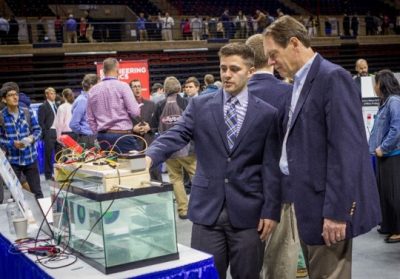 cademic, social, and professional development activities. Workshops, seminars, and networking events will be integral to the program, with the two campuses sharing speakers and co-sponsoring talks. Internships will continue to play a key role in student education. URI and UConn engineering students have been participating in internships in the Navy and Navy-related firms for years, but the grant will allow the universities to build off those relationships and create new opportunities. To create the coalition, engineering professors from both campuses are partnering on the grant initiatives. In addition to Accorsi and Taggart, leaders includes Daniel Burkey, associate dean for undergraduate education and diversity in UConn’s School of Engineering and UConn’s campus director for the program. Another faculty member who is involved, James Miller, professor of ocean engineering at URI, notes the specialization required in this field. “The sea is a very demanding environment,” he says, “and the team of URI and UConn is bringing together some of the best engineers and educators in the world to bear on the Navy’s challenges.”
cademic, social, and professional development activities. Workshops, seminars, and networking events will be integral to the program, with the two campuses sharing speakers and co-sponsoring talks. Internships will continue to play a key role in student education. URI and UConn engineering students have been participating in internships in the Navy and Navy-related firms for years, but the grant will allow the universities to build off those relationships and create new opportunities. To create the coalition, engineering professors from both campuses are partnering on the grant initiatives. In addition to Accorsi and Taggart, leaders includes Daniel Burkey, associate dean for undergraduate education and diversity in UConn’s School of Engineering and UConn’s campus director for the program. Another faculty member who is involved, James Miller, professor of ocean engineering at URI, notes the specialization required in this field. “The sea is a very demanding environment,” he says, “and the team of URI and UConn is bringing together some of the best engineers and educators in the world to bear on the Navy’s challenges.”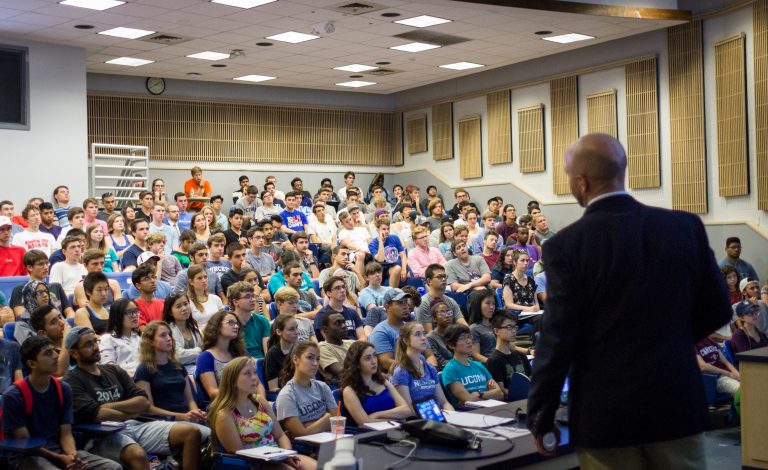 Jeff Hooper ’02 (ENG), a manager of engineering at Electric Boat, was one of the speakers at the event. He told engineering students that he became interested in this career field through work on his senior design project. (Christopher LaRosa/UConn Photo)
Jeff Hooper ’02 (ENG), a manager of engineering at Electric Boat, was one of the speakers at the event. He told engineering students that he became interested in this career field through work on his senior design project. (Christopher LaRosa/UConn Photo)
UConn students who pursue careers through the University’s new undersea engineering program will play a vital role in our national defense and have opportunities to work on some of the most sophisticated submarine s in the world, three members of Connecticut’s congressional delegation said during a rare group visit to Storrs Friday.
s in the world, three members of Connecticut’s congressional delegation said during a rare group visit to Storrs Friday.
Speaking to about 200 first-year engineering students in the Torrey Life Sciences building, U.S. Sens. Richard Blumenthal and Chris Murphy, and U.S. Rep. Joe Courtney, said UConn’s role in training a new generation of highly skilled naval engineers is crucial to maintaining the state’s future economic growth.
“Naval research, naval engineering, naval science has never been more important,” Blumenthal told the students. “The research you are doing now and in the future will be the lifeblood of our national defense.”
Courtney, whose district includes the General Dynamics Electric Boat shipyard in the southeastern corner of the state, described the workplace as having a “Google-like” atmosphere, with waves of young engineers entering the industry and using the latest skills and technologies to build a new generation of submarines for the U.S. Navy. Electric Boat expect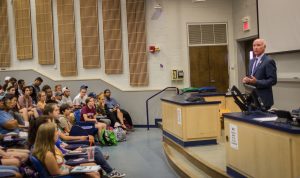 s to hire 14,000 employees over the next decade to keep pace with government demand for new Virginia and Columbia classes of submarines.
s to hire 14,000 employees over the next decade to keep pace with government demand for new Virginia and Columbia classes of submarines.
“It’s really interesting work,” Courtney told the students, an overwhelming majority of whom were from Connecticut. “You’re building a vessel powered by a nuclear engine and armed with some of the most powerful tools in our defense infrastructure. There is no margin for error. That is why the engineering and design work is so important.”
UConn’s new undersea engineering program was made possible through a $1.3 million grant from the Office of Naval Research. Blumenthal, Murphy, and Courtney were instrumental in securing the three-year award.
“We’re all here, the three of us, because this is a groundbreaking project,” Murphy said. “We have a level of excitement that we hope you will share about this project. You know that by simply being selected for a prestigious engineering program like UConn’s, you will be sought after when you leave here and there is probably nothing more exciting than to be working on a submarine. …This is an amazing way for you to give back … and help deliver a product that contributes to the public welfare and defense of this country.”
Southern New England has a long and distinguished relationship with the U.S. Navy. Besides Electric Boat, the region also is home to some 600 smaller firms supplying parts and others services to support the submarine fleet. Other institutions in the region include the Naval Undersea Warfare Center in Newport, Rhode Island and Waltham, Massachusetts-based Raytheon, a leading provider of electronics, missile defense systems, and mission command and control systems for the military.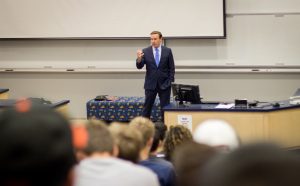
As part of the grant award, UConn, the University of Rhode Island, and the region’s various industries combined to create the Southeast New England STEM Coalition. One of the Coalition’s first acts was to launch the undersea concentration at UConn and URI this fall for up to 50 students on each campus. The nine-credit program features guest speakers with Navy backgrounds, Navy-based undergraduate research and design projects, and a mentorship program.
Existing internship programs are being expanded as part of the new program and will play a key role in the students’ experience.
Electric Boat representative Brenda Petell said the company hired 54 summer interns from UConn this season. Internships are offered to all students – from those in their freshman year to those pursuing master’s degrees. All engineering disciplines are considered, Petell said – mechanical, electrical, structural, chemical, nuclear, naval, and even biomedical. Ninety percent of those participating in the internship program were offered jobs, she noted.
Petell’s comments were good news for Nathan Berardi, a first-year mechanical engineering student from Griswold, Connecticut. Berardi said he has family members who worked at Electric Boat and a cousin working there now. Students he went to high school with are doing drafting work there.
“I think this new program is great,” said Berardi, 17. “I’m going for a mechanical engineering degree and I feel there may be a lot of opportunities for me in the naval industry.”
Taryn Murasso, 18, and a first-year stu dent in environmental engineering was less sure. But she was keeping an open mind.
dent in environmental engineering was less sure. But she was keeping an open mind.
“I want to learn more about it,” Murasso said. “It sounds interesting. But I need to know more.”
A recruiting event for the program will take place in October and seminars are planned for the spring.
